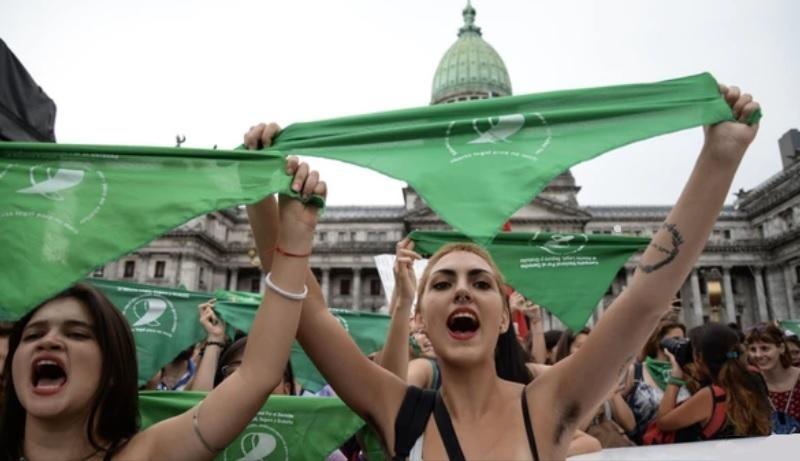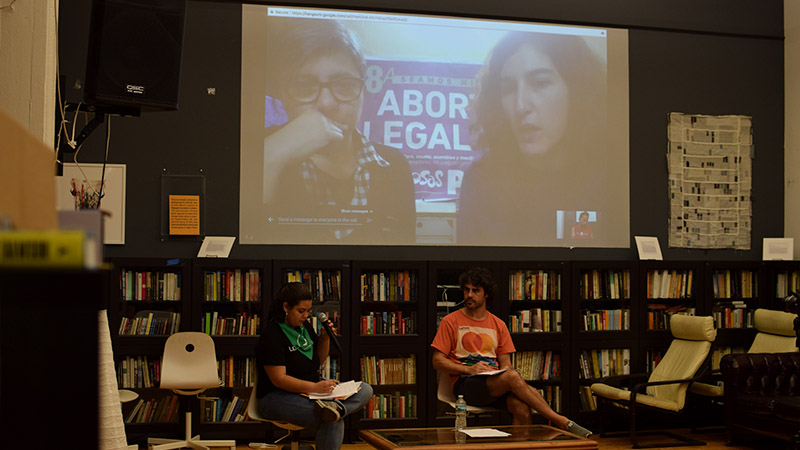On Friday, August 3rd, Left Voice, in conjunction with NYC DSA’s Socialist Feminist Working Group and Verso Books, hosted a live discussion with two socialist feminists leading the struggle to legalize abortion in Argentina. Nathalia González Seligra, a member of Congress for the Left and Workers’ Front and a part of the Partido de Trabajadores Socialistas (Party of Socialist Workers) and Andrea D’Atri, the founder of the organization Pan y Rosas (Bread and Roses) and also member of PTS, spoke about the massive demonstrations that led the lower house of Congress to pass a motion on June 14th to legalize abortion nationally in Argentina.
This outcome is unprecedented–the Catholic Church has huge sway in Argentina, and this recent push for abortion rights was vehemently opposed by the church. Seligra and D’Atri shared their perspectives on what led up to this moment and what comes next for socialism and the women’s movement in Argentina as legalization prepares to go up for a vote before the Senate on August 8th. Whichever way the vote goes, American socialists can take away valuable lessons from this struggle.
Seligra and D’Atri put the importance of the vote in stark perspective, explaining how women’s deaths due to unsafe illegal abortions should be considered femicides perpetrated by the state. A rallying slogan of this movement has been “Sex education so we can decide, contraceptives to prevent abortions and legal abortion so we don’t die.”

Women’s Solidarity and Class Solidarity
In their talk, Seligra and D’Atri were adamant that the reason this movement has been successful is because of solidarity along class lines, not only gender lines. In other words, the movement’s success was not due to a universally-acknowledged solidarity among women. Just a few years ago, Argentina was led by president Cristina Fernández de Kirchner of the Front for Victory, a Peronist alliance heavily influenced by the Catholic Church. Kirchner refused to allow a vote on abortion legalization to take place in Congress and stood by as thousands of women died from clandestine abortions. Who stood in solidarity with these women? The socialist parties, the Left, and people in the streets– workers and women who through persistent mobilizations pressed the issue and eventually achieved the passage of the vote through the lower house.
What we in the United States can learn from the Argentine struggle for abortion rights is clear: working class solidarity can achieve headway on women’s issues much more than liberal or reformist politicians or parties ever can. Over half of the working class in Argentina is now comprised of women. For long, labor struggles have been associated with men, but in fact, labor is, and should be, as much women’s struggle just as it is men’s struggle. Socialist feminists like the members of the Pan y Rosas organization frame women’s struggles as tightly linked to the class struggle.
The General Strike
That women’s issues are class issues is evident in the mobilizations that led up to the June 14th decision; workers stood in solidarity with women in the streets as they demanded free, legal, and safe abortion. Now, today, August 8, the day of the vote, Pan y Rosas, PTS and leaders such as Seligra and D’Atri are calling for a general strike in solidarity with the movement for abortion rights.
This demonstrates the incredible potential of socialist feminism– strikers will show that workers will not sit idly by while the lack of rights such as abortion continues to harm the lives and livelihoods of all people, particularly working-class women. This general strike also denies the opportunity for a placating neoliberal feminism to arise: Seligra and D’Atri discussed that while there is marriage equality in Argentina, its passage into law occurred not in response to labor power in the streets, but instead via the lobbying of LGBTQ nonprofits assisting bourgeois politicians in maintaining in power.

Young People: Politicized, Radicalized, and Empowered
Seligri and D’Atri also noted that the recent mobilizations are remarkable because of the proportion of young, newly politicized and radicalized people leading the struggle. Girls as young as twelve and thirteen organized occupations in their schools and participated in the demonstrations outside of Congress on June 13th.
Similarly, in the United States, a new wave of socialists are finding political consciousness and very young people have already demonstrated a resolve to fight against the injustices of capitalism. American socialists should learn from Argentina’s example and continue to strengthen their ties with youth movements in schools and universities and promote young people’s leadership within future struggles, rather than relying on them to push voters to the polls.
Mobilization, Not Power to the Polls
Throughout the discussion, Seligra and D’Atri emphasized that the outcome of June 14th was not the result of calls for the election of pro-choice politicians into office, lobbying, or consensus within the government; this bill was proposed to Congress for a decade without ever being discussed and today representatives in Argentina’s congress remain largely divided on the issue of abortion. This initial victory in the continuing struggle to legalize abortion and promote the interests of women and workers was the direct result of the organization of women and other groups within the working class to make their demands clear to a widely right-wing government.
In the months leading up to the June 14th decision, women and girls organized work stoppages, occupations, and walk-outs in their workplaces and schools. They mobilized tens of thousands of people to march to Congress on June 13th as the House of Deputies debated the bill, and they stayed in the streets until the votes were cast and the bill was passed.
Seligra, who is a member of Congress, stressed during Friday’s talk that it was these demonstrations that pushed the lower house to pass the bill, not the unity of Congress or any group therein. This is a crucial lesson for movements within the United States. It means that we do not have to rely on sympathetic politicians to fight class struggles. Those struggles can be waged and won in the streets through the organization of workers and students with unifying programs and clear demands.

The power that such organization has to effect change was hinted at by the sheer number of people who participated in the Women’s Marches in the United States; however, that power was quickly co-opted by proponents of reform by electoral politics, a position encapsulated by the rallying cry of the 2018 Women’s March: “power to the polls.” As we can see from the women’s movement in Argentina, future movements in the U.S. must be organized within workplaces and schools—it won’t happen at the ballot box.
The discussion with D’Atri and Seligra showed those in attendance not only an example of a successful struggle led by the people and clear evidence for the international character of class struggle, but it also provided concrete takeaways for future movements in the United States. In short, their message was clear: our struggles are and will be successful only when they are “socialist, feminist, and internationalist.”











